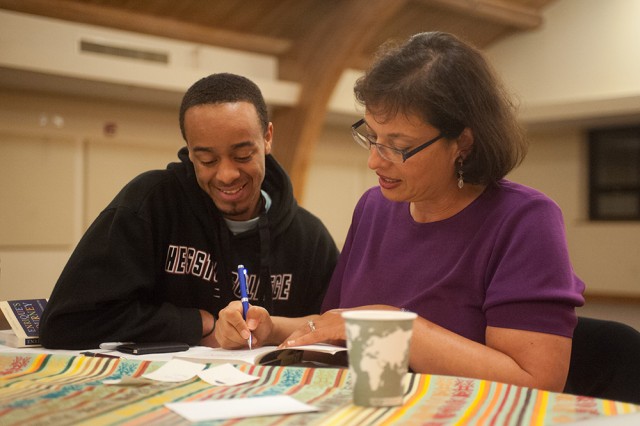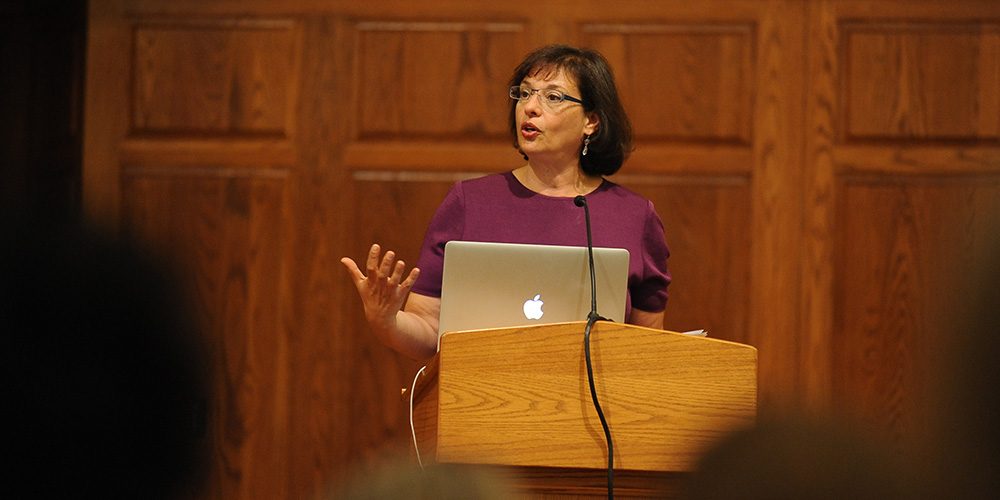During the first half of the semester, Hesston College students have been drawn in to the story of Enrique and his experience as an immigrant in “Enrique’s Journey” by Sonia Nazario. On Oct. 9, they listened, captivated by Nazario’s recounting of her hands-on research for the book when she spoke to the campus and community at Hesston Mennonite Church.
“Enrique’s Journey” is the true story of the dangers and hardships the 17-year-old Honduran boy faced as he tried to reunite with his mother, who left to find work in the United States 11 years earlier. According to Nazario, his story is a familiar one for many Latin American children whose parents leave them behind to try to make a better life for their families.
Immigration is the First-Year Experience seminar theme of study for the year, and “Enrique’s Journey” is the common read, helping students understand the issue from an immigrant’s perspective.
Nazario, a Pulitzer Prize-winning journalist for feature writing, followed Enrique’s path from Honduras to the U.S., traveling the same way he did – on top of trains – and facing the same dangers in her quest to give readers rarely seen insight into the lives of immigrants.
The issue hit her radar when she learned her housekeeper left behind four children in Guatemala, whom she hadn’t seen in 12 years.

“As I listened to her story, I realized that this is incredibly common,” said Nazario. “These parents don’t leave their children because they don’t love them. They leave because they think it is the best way to provide for them.”
The unemployment rate in Honduras is 44 percent, which puts the United States’ eight percent unemployment rate into perspective, she said.
Determination, said Nazario, is the motivating factor behind the tragic issue – parents’ determination to provide for their families and children’s determination to travel alone to an unfamiliar country to search for the parents they haven’t seen in years.
“I came to understand the enormous determination these immigrants have to have,” said Nazario. “I cannot imagine having that kind of determination, but to the children, the obstacles they face along the way are small in comparison to finding their parents.”
Enrique’s journey took 122 days and eight attempts before he was successful. Along the way he was mugged and beaten by gangs, went days without food or water and faced the ever-present threat of being crushed by train wheels.
Nazario followed the same path, traveled the same way and talked to the same people in an attempt to recount his journey as accurately as possible.
“I wanted to see his misery so I could write about it and show people what this journey is like,” said Nazario. “When talking about immigrants, for many people, the first reaction is to demonize them. In telling Enrique’s story, my hope was to humanize them by sharing the inherent struggle for survival.”
Nazario has covered hot button issues, including immigration, from a journalistic standpoint, for 30 years, discussing the subjects with a social justice stance.
“Immigration is not a new subject for me, but there were many things I didn’t understand about immigrants until I made that trip,” she said.
Many students, faculty, staff and community members who read the book also looked at immigration in a new way for the first time.
“Immigration is such a huge issue right now,” said Hesston College freshman Drew Hostetler of Goshen, Ind. “Reading the book and discussing it in class has helped me view the issue in new ways and think critically about it.”
“Reading ‘Enrique’s Journey’ made the immigrant experience more real for me,” said freshman William Wyatt of Rose Hill, Kan. “I feel more sympathetic toward their experiences and view them in a more positive way.”
Students will conduct their own immigration related research to share with the larger community in the annual First-Year Experience symposium at the end of the fall semester.
Other fall First-Year Experience sponsored events include a plenary session with University of Kansas (Lawrence) American Studies professor Ben Chapel; a dialogue with the Director of the Office of Immigration Education for Mennonite Central Committee, Saulo Padilla; a multicultural film festival; and an Immigration and the Arts Week.


